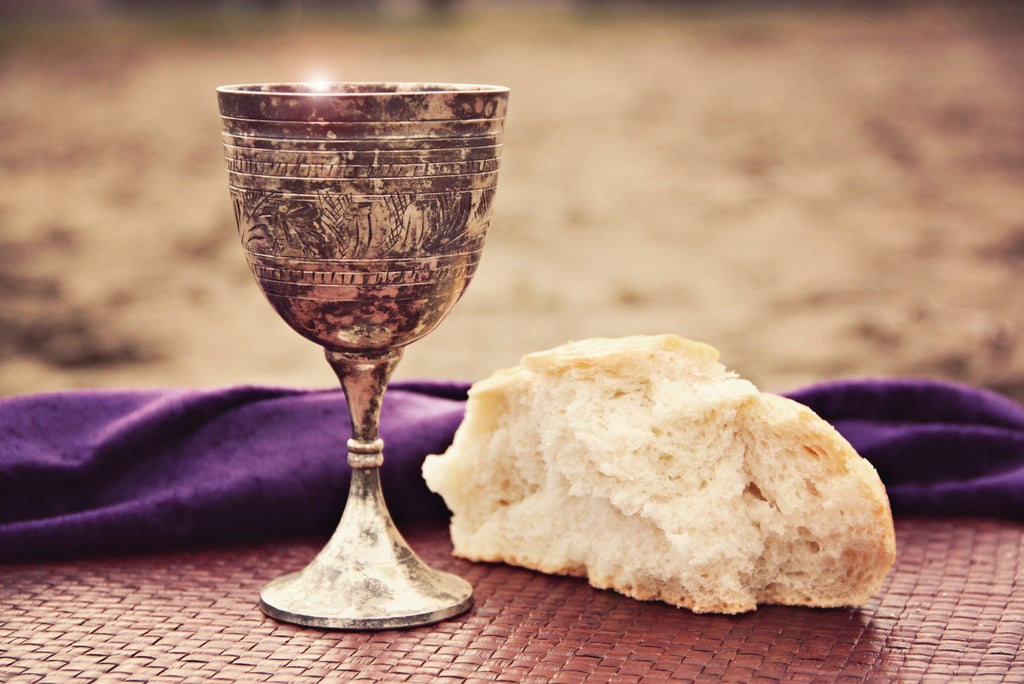The Sacrament of the Eucharist
The source and summit of the Catholic faith.
CATECHESISSACRAMENTSEUCHARIST


The third sacrament of initiation is the Eucharist. Volumes have been written on the Eucharist and volumes more will be written before Jesus returns for the final judgment. The Eucharist is the source and summit of the entire Catholic faith and the greatest of all sacraments. As Catholics, we believe that the Eucharist is the actual body, blood, soul, and divinity of Jesus. We believe in the real presence of Jesus in the Eucharist. The bread we receive at our communion meal does not simply contain Jesus. It is Jesus. Our faith begins in the Eucharist, flows from the Eucharist, and is brought to perfection through the Eucharist. The Eucharist is the reason to become Catholic, remain Catholic, or return to the Catholic faith if one has strayed.
The Jewish religion had a sacrifice for just about everything. One of those sacrifices was known as the korbon todah or the Sacrifice of Thanksgiving. If that sounds familiar it is because that is also another name for the Catholic Mass. The Catholic Mass is also known as the Sacrifice of Thanksgiving. This isn’t a coincidence. When the temple was destroyed in 70 AD the Jewish people lost their ability to offer animal sacrifice to God. The only exception to this was the personal sacrifice of thanksgiving, the korbon todah. That was because the korbon todah could be done without animal sacrifice.
This is where the Catholic Mass got its start. The Christ believing Jews would gather together and offer the personal Sacrifice of Thanksgiving. Because they were prevented by law from offing this sacrifice on the Sabbath, which is Saturday, they offered it on the first day of the week. This is also the day that Christ rose from the dead. This is why our day of obligation is on Sunday, not Saturday. We gather together on Sunday, the day our Lord rose from the dead, to offer a personal Sacrifice of Thanksgiving to him, together as a community.
If the Catholic understanding of the Eucharist is wrong, our faith is in vain. It has no meaning. If the Catholic understanding of the Eucharist is true, then no other religion can suffice, for they all lack the one thing the Catholics have and that is the Eucharist.
Catholics believe in the real presence of Jesus in the Eucharist. This happens through the miracle of transubstantiation. Transubstantiation is a word that means the changing of substance. What it means is that through the words of consecration, the Eucharist transforms from mere bread and wine into the body and blood of Jesus. The accidents of the bread and wine, that is, the attributes, the characteristics, look, feel, and taste, those remain the same but the substance, the essence of the bread and wine, is transformed. Once the bread and wine are transformed, they are no longer bread and wine but the body, blood, soul, and divinity of our Lord Jesus Christ. Once they are transformed, they never change back to bread and wine. They remain Jesus for as long as they are in this form.
Why do we believe what we believe? It all starts with the feeding of the 5000. Jesus had become quite popular and his disciples numbered in the thousands. They followed him from place to place to listen to him teach. On one of these occasions, it was late in the day, and the Twelve asked Jesus to dismiss the crowds so they could go and get some food to eat. Jesus told the twelve to feed the people themselves. They barely had enough food to feed themselves, let alone over 5000 people. They had yet to come to trust in Jesus. Jesus took the food they had and miraculously multiplied it to feed everyone who was there.
After the meal, Jesus and the Twelve went off on their own to rest and pray. The people hurried to where Jesus was. Jesus knew that they had followed him because they wanted another miraculous meal. He gave what is known as the Bread of Life discourse where he reminded them that their ancestors ate the mana that had come down from heaven. All who ate that mana died. Then he told them that he was the true bread that comes down from heaven and anyone eating this bread would live forever.
Cannibalism is repugnant to the Jews. They began to grumble among themselves. How could Jesus give them his flesh to eat? Jesus told them that his flesh is true food and his blood true drink and anyone who does not eat his flesh and drink his blood does not have life within them. It was then that the crowd rejected him and left him. He did not try to stop them. He did not say that he was only speaking about eating his flesh and blood spiritually or symbolically. He let them go because he knew they were not ready to believe this teaching. Then he turned to the Twelve and asked if they were going to leave him as well.
Peter spoke up and said, “Where would we go? You have the words of eternal life.”
We take Jesus at his word. We believe that his flesh is true food and his blood true drink and that is it necessary for us to eat and drink of his body and blood to go to heaven when we die. It wasn’t until the last supper on the night before his death that Jesus would reveal how he was going to make it possible for the world throughout all time to be able to eat his flesh and drink his blood.
As the words of consecration in our Mass says –
“On the day before he was to suffer,
he took bread in his holy and venerable hands,
and with eyes raised to heaven
to you, O God, his almighty Father,
giving you thanks, he said the blessing,
broke the bread and gave it to his disciples, saying:
“Take this, all of you, and eat of it,
for this is my body,
which will be given up for you.”
And the words of consecration of the wine –
“Take this, all of you, and drink from it,
for this is a chalice of my blood,
the blood of the new and eternal covenant,
which will be poured out for you and for many
for the forgiveness of sins.
Do this in memory of me.”
By these words given to us by Jesus and by his authority, our simple gifts of bread and wine become for us the body and blood of Jesus. This allows us to fulfill his command to eat his body and drink his blood in our age in and our place and therefore be united with him throughout all time and space for all eternity.
At the last supper Jesus instituted the priesthood and gave them his authority to consecrate the Eucharist. This authority has been passed down through apostolic succession to our priests today. They are the only ones who have the authority to consecrate the Eucharist. This is the primary reason that we do not accept any of the Protestants’ eucharists as being valid. They do not have the authority to consecrate, therefore what they offer is not the body, blood, soul, and divinity of Jesus. It is just bread and wine.
Non-Catholics and even many Catholics do not understand why the Church does not invite everyone to celebrate in our communion. Catholics will share the Word of God with anyone who will listen, but only share the Body of God to those in the club. To receive the Eucharist in the Catholic Church you have to be a Catholic in a state of grace (no mortal sin on their soul). Why?
Because the Eucharist is a Sacrament, and like all Sacraments, it deals with something given, not received. When we receive a Sacrament, we enter into a covenant relationship with God. A covenant relationship requires a blood sacrifice and is binding for eternity. When you freely accept the Body and Blood of our Savior, you are reaffirming the oath to the death that was taken by you or for you in baptism and then reaffirmed in your confirmation. You are swearing that you will live your life for Jesus and die for him if necessary. To accept the Eucharist and then go out and live an unchristian life you risk serious harm both physically and spiritually.
“Therefore whoever eats the bread or drinks the cup of the Lord in an unworthy manner, shall be guilty of the body and the blood of the Lord. But a man must examine himself, and in so doing he is to eat of the bread and drink of the cup. For he who eats and drinks, eats and drinks judgment to himself if he does not judge the body rightly. For this reason many among you are weak and sick, and a number sleep. But if we judged ourselves rightly, we would not be judged. But when we are judged, we are disciplined by the Lord so that we will not be condemned along with the world.”
This is Saint Paul’s way of saying that if you enter into this oath unworthily you can bring sickness, even to the point of eternal damnation, upon yourself if you do not live up to the oath. For this reason, we cannot give the Eucharist to just anyone who wants it. We cannot just give it to everyone and let Jesus work within them. The Eucharist is a very powerful medicine for the healthy, and a very powerful poison to the sick. One has to be in a healthy state of grace, healed of their sins through the sacrament of reconciliation, and in the proper state of mind to take part in the Supper of the Lamb.
The Eucharist is not merely a symbol of Jesus. In a wedding ceremony, the bride and groom exchange rings as a sign of their love and fidelity. The rings are just a symbol of the love they have for one another. The real love they have is expressed when then they give their full selves to each other in a sacrificial life. Like with a bride and groom, Jesus gives us his full self in sacrificial love. The Eucharist is not a sign of this love, but love itself.
How long would a marriage last if the husband gave his wife a ring and then never spent time with her? How much more would our faith be in vain if the Eucharist were only a symbol? Without the real presence of Jesus, Mass ceases to be the wedding banquet of the Lamb to his bride the Church, and becomes nothing more than an instruction of the faithful. Why would you attend a wedding if the groom wasn’t there and only sent a ring in his place? The Mass is the wedding banquet where the groom gives us himself, body, blood, soul, and divinity, so that we may have life within us and be with him for all eternity.
The Eucharist is the source and summit of our Catholic faith. It is not only where our faith begins, but it is the fulfillment of it. It is what sets us apart from all other people on this earth.
Evangelizing Worldwide
© 2025. All rights reserved.


Contact Me

